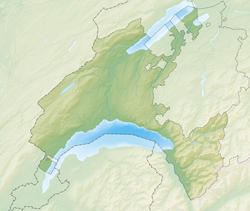Villarzel, Switzerland
| Villarzel | ||
|---|---|---|

Farm house in Sédeilles village
|
||
|
||
| Coordinates: 46°45′N 6°55′E / 46.750°N 6.917°ECoordinates: 46°45′N 6°55′E / 46.750°N 6.917°E | ||
| Country | Switzerland | |
| Canton | Vaud | |
| District | Broye-Vully | |
| Government | ||
| • Mayor | Syndic | |
| Area | ||
| • Total | 7.66 km2 (2.96 sq mi) | |
| Elevation | 622 m (2,041 ft) | |
| Population (Dec 2015) | ||
| • Total | 416 | |
| • Density | 54/km2 (140/sq mi) | |
| Postal code | 1555 | |
| SFOS number | 5830 | |
| Surrounded by | Cerniaz, Châtonnaye (FR), Henniez, Marnand, Rossens, Sédeilles, Villars-Bramard | |
| Website |
website missing Profile (French), SFSO statistics |
|
Villarzel is a municipality in the district of Broye-Vully in the canton of Vaud in Switzerland. On 1 July 2006, Villarzel incorporated the formerly independent municipalities of Rossens and Sédeilles.
Villarzel has an area, as of 2009[update], of 7.7 square kilometers (3.0 sq mi). Of this area, 5.39 km2 (2.08 sq mi) or 70.4% is used for agricultural purposes, while 1.85 km2 (0.71 sq mi) or 24.2% is forested. Of the rest of the land, 0.44 km2 (0.17 sq mi) or 5.7% is settled (buildings or roads).
Of the built up area, housing and buildings made up 2.6% and transportation infrastructure made up 3.1%. Out of the forested land, all of the forested land area is covered with heavy forests. Of the agricultural land, 51.3% is used for growing crops and 17.0% is pastures, while 2.1% is used for orchards or vine crops.
The municipality was part of the Payerne District until it was dissolved on 31 August 2006, and Villarzel became part of the new district of Broye-Vully.
The blazon of the municipal coat of arms is Per fess Argent and Gules, overall a Tower roofed Sable, masoned and windowed Argent.
Villarzel has a population (as of December 2015[update]) of 416. As of 2008[update], 6.4% of the population are resident foreign nationals. Over the last 10 years (1999–2009 ) the population has changed at a rate of 1.1%. It has changed at a rate of 2.1% due to migration and at a rate of 0% due to births and deaths.
Most of the population (as of 2000[update]) speaks French (175 or 92.1%), with German being second most common (9 or 4.7%) and Portuguese being third (3 or 1.6%).
...
Wikipedia




